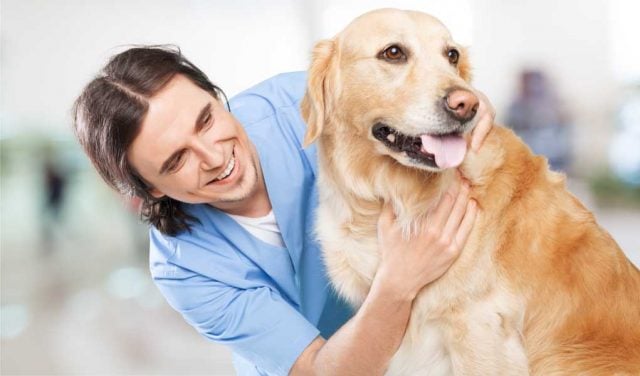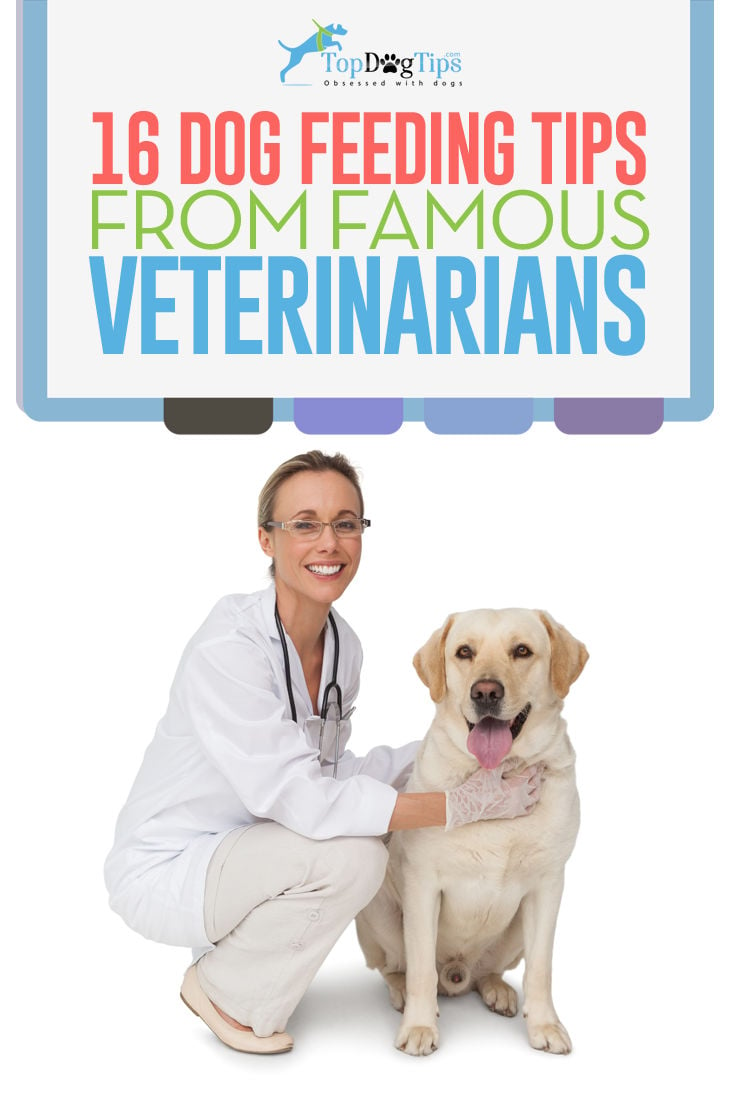
Table of Contents
Food and nutrition is a confusing subject. It’s hard to know what kind of foods are healthy for ourselves, never mind our dogs. Veterinarians are the experts on pet health, though, and no one is closer to the front lines to see just what pet food does to our dogs.
That's why the advice from veterinarians who studied dog nutrition for years is so valuable to all pet parents. They will tell you exactly how to feed a dog and what dog foods to use. In this article, we've gathered the best information from four famous veterinarians who've provided some valuable tips on feeding dogs and specific dog food brands.
When you adopt a dog, the first and best thing that you can do is have a conversation with your vet as soon as you bring your new furry friend home. Discuss your dog's age, breed, energy level, weight, and any health conditions he may have. This will help your vet understand your dog's unique nutritional needs.
Today, there are tons of different dog food diets and recipes to choose from, but whether you decide to purchase commercial dog food brands or make your own homemade dog food meals for the Fido, your vet can tell you what nutritional guidelines to follow.
ALSO READ: The Science-based Guide for Feeding Athletic Dogs
16 Best Tips from Four Famous Vets on Dog Nutrition and Feeding
Dr. Karen Becker's Advice on Picking Dog Food
Dr. Karen Becker has been on the hit TV show The Animal Planet. She was named one of Chicago's Top Ten Vets, according to Chicago Magazine, for her work as a proactive and integrative wellness veterinarian.
You can find more information about Dr. Becker on her personal site, DrKarenBecker.com. Here are some of her best tips for canine nutrition and how to feed a dog.
1. Dogs need moisture in their diet
Dogs are carnivores, so they need high-quality protein, preferably from wet dog foods with plenty of moisture. If dogs were to hunt their own food, it would be 70 percent moisture.
If you compare that 70 percent number to the 12 percent moisture of most dry dog foods, you immediately see how a diet of kibble and pellets alone could be harmful. Dogs that only eat dry dog foods are in a constant, low state of dehydration, which damages their kidney function and may be at risk of kidney disease.
2. Dogs don’t need a lot of starch, grains, or carbs
Some of the most popular commercial dog food brands are all made in a very similar way. These dog foods are usually high in corn, wheat, soy, and rice, but dogs have no biological need for these foods, according to Dr Karen Becker.
Pet parents who focus on high-quality, protein-rich dog foods will have no problem avoiding starch, grains, and carbohydrates in their canine's diet.
3. Balance is important
The best way to make sure that your dog’s diet has the correct balance of vitamins, nutrients, and enzymes is to make sure they’ve been tested and researched.
Nutrition deficiencies will cause dogs and cats to develop health problems with their bones, organs, and endocrine systems much faster than a human would – sometimes before they’re even six months old.
Your veterinarian or a canine nutritionist will be able to tell you the correct balance of nutrients that your dog's body needs. This depends on many factors, including his age, weight, and activity level.
4. Homemade isn’t automatically healthy
Owners that cook their dog’s food or provide them with raw meat obviously have good intentions, but it isn’t easy to always provide a balanced diet for dogs, strictly from cooking homemade dog food meals and using only the regular ingredients.
Omega-3 fatty acids, calcium, and a variety of trace minerals are all important to a dog’s long-term health. The right balance in their diet shouldn't be a matter of guesswork.
If you're looking to start cooking for your dog, you can find tons of recipes with instructions and step-by-step videos in our Homemade Dog Food Recipes section.
5. Propylene glycol isn’t a healthy ingredient
Propylene glycol is a common preservative found in some dry dog food brands and semi-moist pouches. While it’s an approved ingredient by the FDA, it’s related to antifreeze, and many veterinarians consider this to be unhealthy for dogs.
Many of these suspicious ingredients cause health issues in dogs, and it's best to avoid them. Learn how to read dog food labels and check dog food recalls to see a trend of which companies would be best to avoid in the future. Some dog foods have been directly linked to several canine diseases, and we mentioned those in the article below.
READ MORE HERE: 3 Common Canine Diseases Linked To Dog Food
Dr. Debbye Turner's Truths about Pet Foods
Dr. Debbye Turner Bell may have been the winner of the 1990 Miss America Pageant, but she isn’t just a pretty face. She’s appeared on Animal Planet's Cats 101 and Dogs 101. Read more about her on Dr. Turner's personal site, DebbyeTurnerBell.com.
Dr. Debbye Turner has also been the resident veterinarian for CBS News and had some very valuable tips to contribute. Here's what she has to say about the pet food industry.
6. Pet food is big business, but it can’t always be trusted
Americans spend as much as $16 billion a year on pet food. There’s a lot of competition for that money, but many owners have no idea what’s in their dog’s food. As a result, there are a lot of controversies surrounding the pet food industry. The pet food recalls of 2007 alone should teach us how disastrous it can all be for our dogs’ health.
7. Look for ingredients you know on the label
Avoid artificial ingredients, preservatives, flavors, and colors. The first ingredients should be recognizable, such as meat, grains, fruit, or vegetables.
Ingredients like corn, wheat, dairy, eggs, soy, and beef products are all common allergens, so we need to be aware of how our dogs digest them and what they can do to pets.
8. Know what beef and meat byproducts mean
According to a survey, a lot of pet owners don’t know what meat byproducts might include.
If you don’t know what something is on a pet food label, look it up online.
In this case, meat byproducts could include any part of a whole animal carcass like:
- beaks
- feathers
- lungs
- brain
- blood
- the stomach
- intestines
Many vets advise against giving your dog foods with meat byproducts and recommend choosing organic dog food brands, particularly those of human-grade quality.
9. Dry food can be beneficial for dogs who overeat
Dogs love wet dog food. They'll often eat as much of it as they can get, so it might be better to use it as a treat for overweight dogs.
Either way, work out how many calories your dog needs with your veterinarian and stick to a good dietary plan with your canine to avoid diabetes and getting your dog fat.
LISTEN: Podcast on Dealing With Canine Diabetes ft. Rachel Poulin, RVT
Dr. Marion Nestle's Take on the Pet Food Market
Dr. Marion Nestle is a professor of nutrition, food studies, and public health at New York University. She’s also written three prize-winning books, one of which became a best-seller and even inspired a documentary: Food Politics (2013), Safe Food (2003), and What to Eat (2007).
You can read more about Dr. Nestle as well as her very informative blog on her website, FoodPolitics.com. Here's what she has to say about pet food and the industry itself.
10. Pet food regulations are bizarre
Unfortunately, there’s very little national regulation or oversight regarding what’s in pet food. Pet food labels don’t have to be set up the same way as those on human food, and they can be even harder to understand. Therefore, dog owners need to be vigilant.
11. The long-term effects of different dog diets haven’t been researched
There haven’t been any reliable studies measuring pet longevity due to raw, vegetarian, premium, or balanced pet food diets by pet food companies. Other than we seriously need more research on this, pet parents must also use caution and common sense.
Just because it looks good on a label, that doesn’t mean it’s more than an advertising ploy. The exception is the term human-grade, which means the dog food meets all the standards of human food production, but very few pet foods are allowed to use that term, mostly because it's very difficult to qualify for it.
One of the better-known brands of human-grade dog food is The Honest Kitchen, whose dog food we've reviewed before. They have their factories and foods inspected regularly by the FDA and USDA, and this type of inspection should be applied to all pet food brands.
READ MORE: Expensive Dog Food Brands – Are They Worth the High Cost?
Dr. Kevin Fitzgerald's Advice on Dog Obesity
Dr. Kevin Terrel Fitzgerald is a certified veterinarian from Denver, Colorado. He has appeared on the Animal Planet TV shows Emergency Vets and E-Vet Intern. You can find him on his own website, DrKevinFitzgerald.com. He has talked a lot about obesity and pets and warned pet parents about the importance of this problem and how to fix it.
13. Pet obesity is a growing problem
There isn’t a lot of hard data, but it was estimated in a survey of veterinarians that at least 40 percent of their small animal patients were overweight, and 19 percent were reported as obese.
14. Check if your dog is overweight
You should be able to feel your dog’s ribs, but you shouldn't be able to see them. Look for an indentation of the waist behind the last rib or if the belly drops down.
Pads of fat over the ribs and by the base of the tail are another indication that your dog needs dietary and behavioral changes and a good dietary plan.
If you're unsure of how to tell if your dog is overweight, bring him into your vet's office and they will be able to tell you just from looking at him in the waiting room. Schedule an appointment if you need to discuss dietary and exercise guidelines for your pet.
15. Know the health effects of your dog being overweight
Extra weight causes joint problems and contributes to the development of early arthritis.
Higher incidences of certain cardiovascular conditions, heart disease, and high blood pressure are also common in overweight dogs, as well as a higher risk for liver disease, kidney problems, and even cancer.
16. Make sure your dog gets enough exercise
Just like people, dogs shouldn’t take in more calories than they expend each day. It’s up to owners to make sure their dogs live a balanced life, don’t eat more than they need, and have the right nutrition.
READ NEXT: 10 Vet-Recommended Dog Food Brands That Are Inexpensive
Disclosure: We may earn affiliate commissions at no cost to you from the links on this page. This did not affect our assessment of products. Read more here and find full disclosure here.














